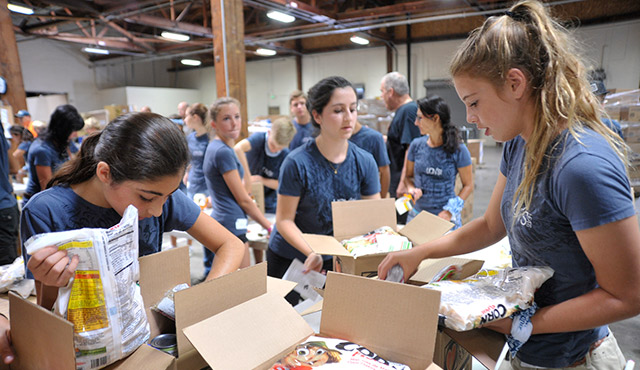Soon after Charles Antis opened his roofing company in 1989, he arrived at a home with a leaky roof and was overwhelmed by the smell of mildew. But he realized the large family living there could not afford a new roof after a little girl showed him her bedroom with four mattresses on the floor.
Then a struggling entrepreneur, Antis scraped together low-cost roofing materials and volunteers who helped him build a roof—not beautiful but serviceable—to keep the family dry.
The gratification of helping this family, Antis says, infused him and ultimately his company, Irvine-based Antis Roofing & Waterproofing, with a passion for giving to the less fortunate.
At age 53, Antis serves on the board of Habitat for Humanity of Orange County, a nonprofit organization that builds affordable homes for limited income families. He has built roofs free of charge for more than 60 new Habitat houses, with roof tiles donated by one of his suppliers, Eagle Roofing Products.
Antis says he finds service to others spiritually satisfying. “I believe it will be the model of the future” for businesses, he says, observing that many younger people in the workforce today seem more interested in sharing than their parents and less interested in amassing personal wealth.
Catholics are similarly urged by their faith to consider their work a mission from God to serve their communities rather than solely as a livelihood.
Father Robert Caro, Vice President of Mission and Ministry at Loyola Marymount University, says the university aims to graduate men and women who will put their faith and education into practice in their careers. He noted that Jesus, through the Scriptures, teaches us to “work for justice and work for those who live on the margins of society.”
One such path is to become an employee or volunteer for a nonprofit organization that has a defined goal of public service.
People who apply for jobs at Second Harvest Food Bank of Orange County often say they are looking for a purpose or a mission-driven place to work, says Jane Van Dyke, the nonprofit organization’s director of human resources.
Not all of Second Harvest’s 72-person workforce engage directly with the public, but Van Dyke says that even the employees from the company’s accounting, administration and human resources departments take pride and find joy in their work contributing to feeding the hungry.
“Just being here, I make a difference for people who work here so they can make a difference in the community,” says VanDyke.
Frank Talarico Jr., 45, of San Juan Capistrano, Chief Executive of Goodwill of Orange County, says his organization’s 1,259 employees are motivated by helping put people to work who are disabled or face other obstacles to employment. He says for many, the chance to work for the mission of a nonprofit organization trumps earning a higher paycheck in the for-profit business world.
Yet working for a profit-making company also can fulfill the Christian mission, says Philip Brach, Assistant Dean of Development for the Catholic University of America’s School of Business and Economics. He noted that Pope Francis has said “business is a noble vocation,” when you understand it as something that God has called you to do.
Business benefits the community, Brach says, by providing employment, goods and services. “The most important thing is first be of service to the people who work for you and with you,” he adds. Growing a business becomes a vocation, he says, when “profit is a key measure but not the end [goal]… Serving others is the bottom line.”
“It doesn’t matter what profession or job you have but how you see it as an expression of who you want to be in the world,” says Arthur Gross-Schaefer, a rabbi, lawyer and certified public accountant who teaches ethics to business students at Loyola Marymount University.
He says a friend of his was impressed when the man in charge of a moving crew reassured him that he was an evangelical Christian “so I will be very careful how I move your belongings. My mission is to create safety for you and move you in a way that you will be relaxed.”
Private companies also donate money, time and expertise to charities through local chambers of commerce and public service organizations like Habitat for Humanity and the Orange County Business Council, which has recruited 300 of Orange County’s largest employers, including the Irvine Company, AT&T, Southern California Edison, Union Bank and Disneyland.
Orange County Business Council Chief Executive Lucy Dunn says one of the council’s current top priorities is to encourage low-income Latinos to get the education they need to fill higher paying jobs.
Those who work for private industry, government and schools have honed skills they can put to use for nonprofit agencies, especially later in their careers and in retirement when their family responsibilities lessen, Dunn says.
“There are a million ways to volunteer, a million ways to get engaged,” says Dunn. “The best advice is to take the first step and explore something that fuels you, where you think you might make a difference.”

